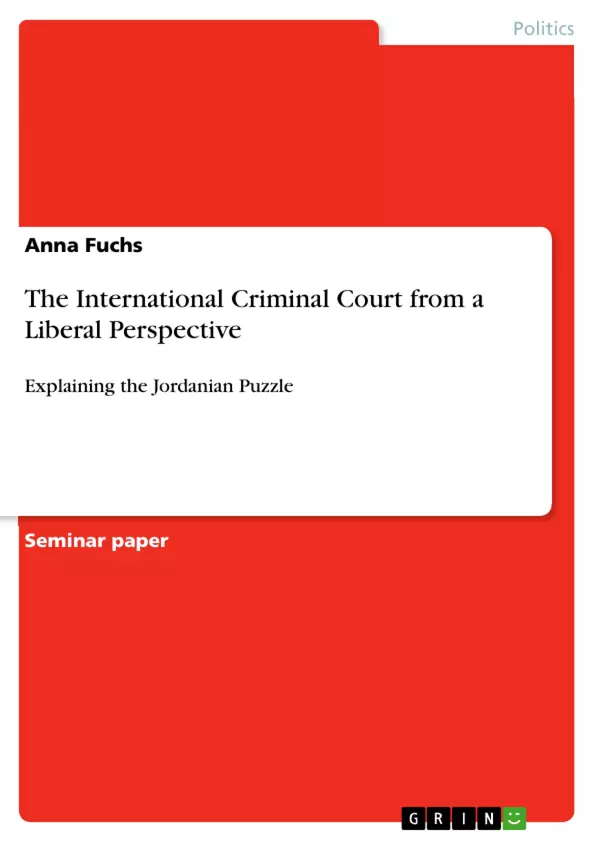[...] What seems to be the greatest puzzle about the “ICC-story” is the fact that the Statute
was adopted despite US opposition. It seemed impossible that an independent court
could be created without the support of the US. And it is indeed remarkable that so
many states agreed on a strong, independent ICC although the US also launched an active
campaign against it and tried to pressure states into signing bilateral agreements in
order to prevent US citizens from becoming subjects to ICC jurisdiction. But, in my
opinion, this is not the only puzzle, because there was another state that acted differently
than expected. This state is Jordan, who was the only Arab state not only to support the
ICC but also to join the Like-Minded Group prior to the conference. It is not surprising
that authoritarian regimes opposed the court. It is surprising however, that Jordan was
the exception to that rule and I think that decision deserves to be examined further.
While republican liberalism offers an explanation to US behavior regarding the ICC, it
fails at explaining the Jordanian case. It predicts that authoritarian regimes will side
with well established democracies in opposition to binding international human rights regimes. Although this did not count for Jordan, I still think that liberalism can explain
why the Kingdom supported the ICC. In order to prove this hypothesis, I will outline the
basic assumptions of (republican) liberalism. Afterwards I will briefly describe the
political, economic and societal situation in Jordan in order to identify the aspects
needed to apply the theory. Finally, I will show how liberalism can explain why Jordan
as an authoritarian regime supported the ICC although it was not “supposed to”.
Inhaltsverzeichnis (Table of Contents)
- Introduction
- The International Criminal Court
- The Rome Conference
- Institutional Design
- Liberalism
- Core Assumptions
- Republican Liberalism and Human Rights Regimes
- Explaining the Jordanian Puzzle with Liberalism
- Political System
- Civil Society and Public Opinion
- Economic Situation
- Jordan's Position Towards the ICC
- Conclusion
Zielsetzung und Themenschwerpunkte (Objectives and Key Themes)
This paper aims to explain Jordan's support for the International Criminal Court (ICC), a decision that contradicts typical expectations for authoritarian regimes. It challenges republican liberalism's explanation of US opposition to the ICC by analyzing the Jordanian case and demonstrating how liberalism can explain Jordan's unique support.
- The establishment and institutional design of the International Criminal Court
- The contrasting positions of the US and Jordan regarding the ICC
- The application of liberal theory to explain Jordan's stance
- The influence of political, economic, and societal factors in Jordan
- The role of civil society and public opinion in shaping national policy
Zusammenfassung der Kapitel (Chapter Summaries)
- Introduction: This section outlines the historical context of the ICC's creation, emphasizing the significance of Jordan's support for the court despite being an authoritarian regime. It introduces the "Jordanian puzzle" and the paper's objective to explain it through the lens of liberalism.
- The International Criminal Court: This chapter provides a detailed overview of the ICC, covering its origins in the Rome Conference, key negotiation points between opposing blocs, and the final institutional design. It discusses the court's complementarity with national courts and its jurisdiction over core crimes like genocide and crimes against humanity.
- Liberalism: This section delves into the core assumptions of liberalism, particularly republican liberalism, and its implications for human rights regimes. It discusses how liberal theory can explain the positions of both the US and Jordan in relation to the ICC.
- Explaining the Jordanian Puzzle with Liberalism: This chapter analyzes the political, economic, and societal context in Jordan to identify factors that might explain the country's support for the ICC. It considers the role of public opinion, civil society, and Jordan's position on the international stage.
Schlüsselwörter (Keywords)
The key terms and concepts explored in this work include: International Criminal Court, ICC, Rome Statute, liberalism, republican liberalism, human rights, authoritarian regimes, international law, Jordan, political system, civil society, public opinion, economic situation, international relations.
Frequently Asked Questions
Why is Jordan's support for the ICC considered a "puzzle"?
It is unusual because Jordan was an authoritarian regime at the time, and such regimes typically oppose independent international courts that could limit their sovereignty or prosecute their leaders.
What is the core focus of the Rome Statute?
The Rome Statute is the founding treaty of the International Criminal Court (ICC), establishing its jurisdiction over crimes such as genocide, war crimes, and crimes against humanity.
How does Liberalism explain Jordan's stance on the ICC?
The paper argues that despite its political system, internal factors like civil society, public opinion, and economic interests influenced the Kingdom's decision to support the court.
What was the United States' position regarding the ICC?
The US actively opposed the ICC, launching campaigns against it and pressuring states to sign bilateral agreements to exempt US citizens from the court's jurisdiction.
What role did the "Like-Minded Group" play?
The Like-Minded Group was a coalition of states that advocated for a strong and independent International Criminal Court during the Rome Conference.
- Citation du texte
- Anna Fuchs (Auteur), 2012, The International Criminal Court from a Liberal Perspective, Munich, GRIN Verlag, https://www.grin.com/document/210631



